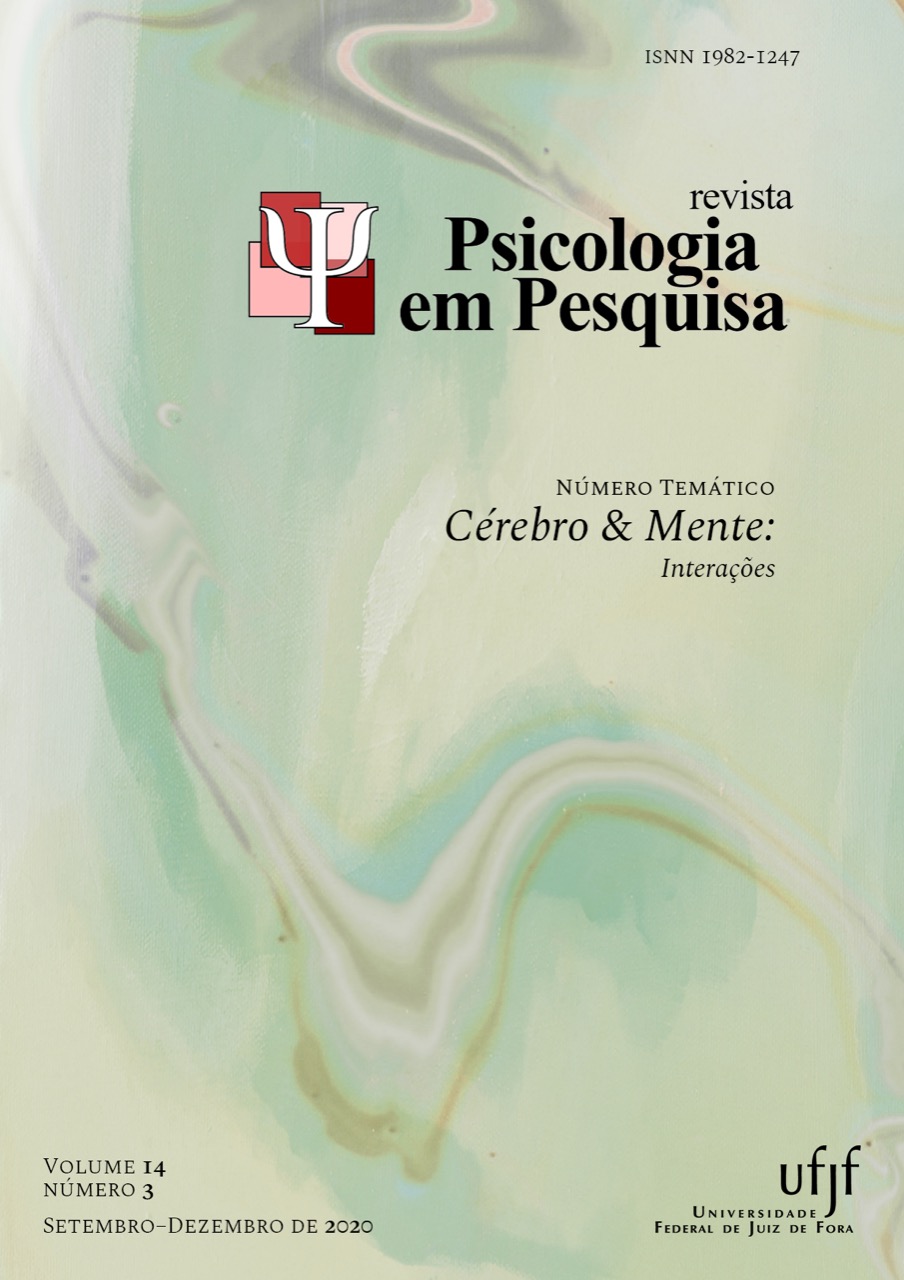The past and future of experimental psychology
Contributions of Fechner, Wundt, and James
DOI:
https://doi.org/10.34019/1982-1247.2020.v14.30297Keywords:
Experimental psychology, History of psychology, Gustav Fechner, Wilhelm Wundt, William JamesAbstract
Both the idea of experimental psychology and the realization of psychological experiments were already present in the 18th century. However, it was in the 19th century, firstly in German universities, that experimental psychology acquired a new status, thereby marking the identity of the new psychology. The aim of this paper is to present a historical-philosophical reflection on the nature of experimental psychology, based on the contributions of Fechner, Wundt and James. After presenting their historical dimension, we discuss their relation with contemporary experimental psychology, in order to clarify whether they can somehow illuminate its future path. We conclude that an effective dialogue depends on the modification of certain structural conditions in the current training model for psychologists.
Downloads
References
Allesch, C. (2018). Fechner’s Ästhetik – Intention und historische Hintergründe seines Werkes. In G. Fechner,
Vorschule der Ästhetik (pp. 1-52). Berlin, Deutschland: Springer.
Araujo, S. F. (2009). Wilhelm Wundt e a fundação do primeiro centro internacional de formação de
psicólogos. Temas em Psicologia, 17(1), 9-14.
Araujo, S. F. (2012). O lugar de Christian Wolff na história da psicologia. Universitas Psychologica, 11(3),
-1024.
Araujo, S. F. (2014). The emergence and development of Bekhterev’s psychoreflexology in relation to
Wundt’s experimental psychology. Journal of the History of the Behavioral Sciences, 50(2), 189-210.
https://doi.org/10.1002/jhbs.21653
Araujo, S. F. (2016). Wundt and the philosophical foundations of psychology: A reappraisal. New York, NY:
Springer.
Araujo, S. F. (2019). Rescuing Fechner from oblivion: Aesthetics between psychophysics and metaphysics.
European Yearbook of the History of Psychology, 5, 177-180.
Araujo, S. F., & Honorato, A. F. (2017). Para além dos princípios de Psicologia: evolução e sentido do projeto
psicológico de William James. Psicologia em Pesquisa, 11(1), 5-13.
http://dx.doi.org/10.24879/2017001100100209
Araujo, S. F., & Lauro, M. (2018). A natureza da psicologia nos ensaios filosóficos (1777) de Johann
Nicolaus Tetens. Revista de Psicología, 27(1), 1-12. http://dx.doi.org/10.5354/0719-0581.2018.50746
Leary, D. (2018). The Routledge guidebook to James’s principles of psychology. London: Routledge.
Mei, M. (2011). L’intuizione dei pensieri. La pars inferior animae nella psicologia cognitiva di Christian
Wolf. Roma, Italia: Aracne.
Miner, B. G. (1904). The changing attitude of American universities toward psychology. Science, 20(505),
-307. https://doi.org/10.1126/science.20.505.299
Moretto, A. (2007). Matematica e psicologia empirica in Wolff. In F. Marcolungo (Ed.), Christian Wolff tra
psicologia empirica e psicologia razionale (pp. 145-165). Hildesheim, Deutschland: Olms.
Münsterberg, H. (1893). Psychological laboratory of Harvard University. Cambridge, MA: Harvard
University Press.
Pereira, T. C. R. (2017). A unidade da psicologia no pensamento de Christian Wolff. Tese de Doutorado. Juiz
de Fora: Universidade Federal de Juiz de Fora.
Perry, R. B. (1935). The thought and character of William James (Vol. 2). Boston, MA: Little, Brown, and
Company.
Putnam, J. (1874). Contribution to the physiology of the cortex cerebrii. Boston Medical and Surgical
Journal, 91(3), 49-52. https://doi.org/10.1056/NEJM187407160910301
Read, J. C. A. (2015). The place of human psychophysics in modern neuroscience. Neuroscience, 296, 116-
https://doi.org/10.1016/j.neuroscience.2014.05.036
Rieber, R. & Robinson, D. (Eds.) (2001). Wilhelm Wundt in history: the making of a scientific psychology.
New York, NY: Kluwer Academic/Plenum.
Robinson, D. (2001). Reaction-time experiments in Wundt’s institute and beyond. In R. Rieber, & D.
Robinson (Eds.), Wilhelm Wundt in History. The making of a scientific psychology (pp. 161-204). New
York, NY: Kluwer Academic/Plenum.
Robinson, D. (2010). Fechner’s inner psychophysics. History of Psychology, 13(4), 424-433.
https://doi.org/10.1037/a0021641
Rydberg, A. (no prelo). Wolff and the beginnings of experimental psychology in the eighteenth century. In S. F. Araujo, T. C. R. Pereira, & T. Sturm (Eds.), The force of an idea: New essays on Christian Wolff’s
psychology. New York, NY: Springer.
Skrupskelis, I., & Berkeley, E. (Eds.) (2001). The correspondence of William James (Vol. 9). Charlottesville,
VA: University Press of Virginia.
Skrupskelis, I., & Berkeley, E. (Eds.) (2002). The correspondence of William James (Vol. 10). Charlottesville,
VA: University Press of Virginia.
Solomon, J. (2011). Fechner’s legacy in psychology: 150 years of elementary psychophysics. Leiden, The
Netherlands: Brill.
Sturm, T. (2009). Kant und die Wissenschaften vom Menschen. Paderborn, Deutschland: Mentis.
Taylor, E. (1990). New light on the origin of William James’s experimental psychology. In M. Johnson, & T.
Henley (Eds.), Reflections on The Principles of Psychology (pp. 33-61). Hillsdale, NJ: Lawerence
Erlbaum Associates.
Taylor, E. (1996). William James on consciousness beyond the margin. Princeton, NJ: Princeton University
Press.
Tetens, J. N. (2014). Philosophische Versuche über die menschliche Natur und ihre Entwickelung. Berlin,
Deutschland: de Gruyter. (Trabalho original publicado em 1777).
Tinker, M. (1932). Wundt's doctorate students and their theses 1875-1920. American Journal of Psychology,
(4), 630-637. https://doi.org/10.2307/1414529
Wolff, C. (1728). Discursus praeliminaris de philosophia in genere. In C. Wolff, Philosophia rationalis sive
logica (pp. 1-104). Frankfurt & Leipzig, Deutschland: Renger.
Wolff, C. (1732). Psychologia empirica. Hildelsheim, Deutschland: Renger.
Wontorra, H. M. (2009). Frühe apparative Psychologie. Tönning, Deutschland: Der Andere Verlag.
Wundt, W. (1862a). Beiträge zur Theorie der Sinneswahrnehmung. Leipzig, Deutschland: Winter.
Wundt, W. (1862b). Die Geschwindigkeit des Gedankens. Die Gartenlaube, 17, 263-265.
Wundt, W. (1863). Vorlesungen über die Menschen- und Thierseele. Leipzig, Deutschland: Voß.
Wundt, W. (1874). Gründzüge der physiologischen Psychologie. Leipzig, Deutschland: Engelmann.
Wundt, W. (1889). System der Philosophie. Leipzig, Deutschland: Engelmann.
Wundt, W. (1908-1911). Grundzüge der Physiologischen Psychologie (6 ed., 3 Vols.). Leipzig, Deutschland:
Engelmann.
Wundt, W. (1909). Das Institut für experimentelle Psychologie. In Universität Leipzig (Ed.), Festschrift zur
Feier des 500 jährigen Bestehens der Universität Leipzig (pp. 118-133). Leipzig, Deutschland: Hirzel.
Wundt, W. (1911). Naturwissenschaft und Psychologie. Sonderausgabe des Schlussabschnittes zur sechsten
Auflage der physiologischen Psychologie. Leipzig, Deutschland: Engelmann.
Zelle, C. (2001). Experiment, Experience and Observation in Eighteenth-Century Anthropology and
Psychology – the Examples of Krüger’s Experimentalseelenlehre and Moritz’ Erfahrungsseelenkunde.
Orbis Litterarum, 56, 93-105. https://doi.org/10.1034/j.1600-0730.2001.d01-36.x















